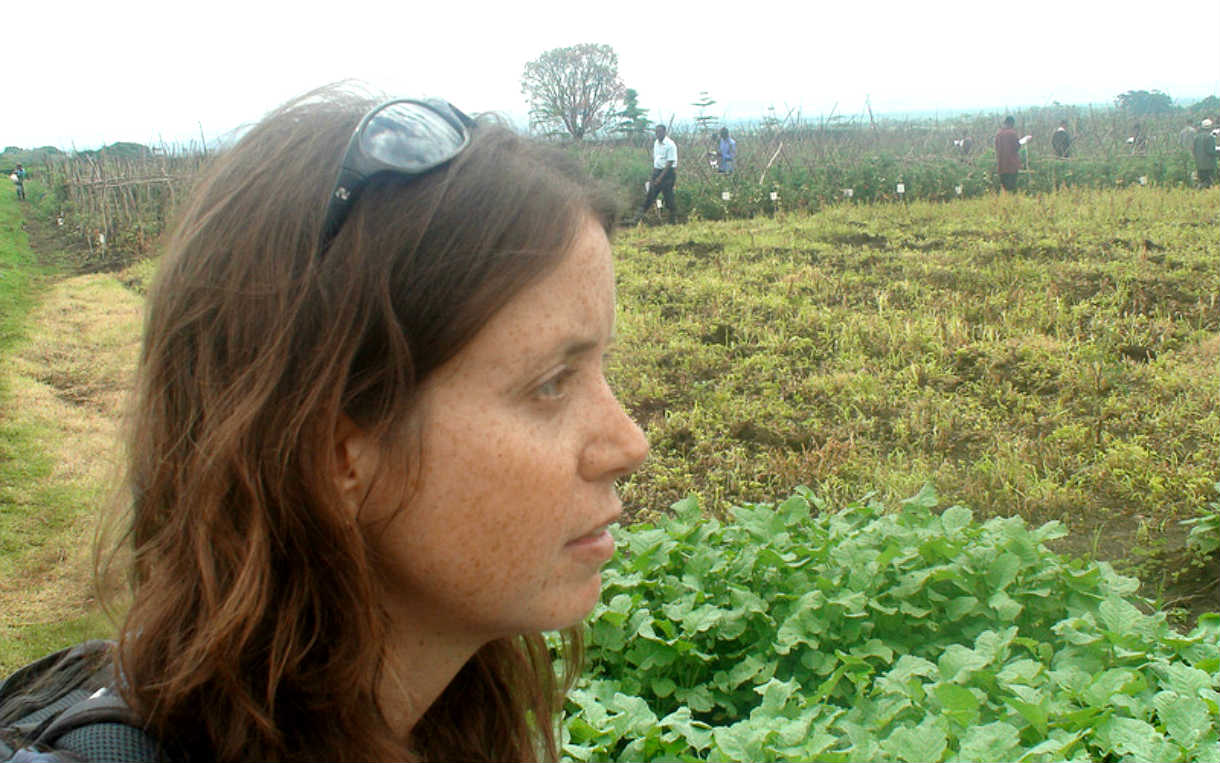
“We aren’t all producers, but we’re all eaters,” Danielle Nierenberg pointed out last night. Nierenberg is the president and founder of Food Tank, a nonprofit organization begun in 2013 that is “dedicated to building a global community for safe, healthy, nourished eaters.” The event was part of the Levitt Center Speaker Series, and was additionally supported by the Arthur Coleman Tuggle Fund.
Nierenberg has traveled to over 60 countries in Sub-Saharan Africa, Latin America and Southeast Asia, as well as extensively within the US, in order to understand what small farmers think it will take to overcome the issues surrounding the food industry and its impact on the environment.
Combining information from the farmers and practices from other NGOs, environmental advocates and sustainable agriculture activists, Nierenberg developed a recipe for a “future of food that decreases loss and waste, increases crop diversity and soil efficacy through indigenous plants and traditional practices, abates obesity, malnutrition and climate change, and provides equal access to economic and educational resources to women farmers.”
Nierenberg began by describing the “broken food system” in, not only the United States, but in the world. Instead of agricultural technology and reform being implemented from the top-down, via policy makers, machine manufacturers, food distributors, and lobbyists, “we need to be listening to the local farmers, and understand that it’s not always the costly or high-tech methods that are most appropriate,” Nierenberg explained.
The most fundamental problem, and the most overlooked, according to Nierenberg, is how we are utilizing soil. Current agricultural practices expose topsoil and reduce soil depth, which decreases resilience to drought and results in decreased nutrition and fertility. A few solutions to this are to “Never farm naked,” meaning to use some type of groundcover to prevent erosion and maintain nutrients, and to invest in perennial crops which grow deeper roots and hold more water.
The second problem, and arguably the most pernicious, is food loss and waste. Nierenberg explained that nearly 40% of the annual global harvest never makes it to a table. On top of this, nearly one-third of the food that Americans do take home ends up being thrown away due to misunderstandings of expiration dates and proper storage. This is significant because food produces methane gas when it decomposes in landfills and is 27% more potent than carbon monoxide in its effects on climate change.
To combat food loss during transportation and increase access to nutrient rich foods in poverty stricken areas, it’s necessary to start producing more in urban areas. Not only does this benefit the community by providing better quality food, it also keeps money within the community and bolsters regional and national security. This is particularly important in developing countries, where food purchases account for up to 80% of a family’s income.
Part and parcel with this urbanization of production, is integration of a larger variety of crops. Nierenberg explained that since the Green Revolution of the 1950’s, Europe and the US have focused more research and subsidizing for starches and grains increasing malnutrition and affecting child mortality. Today there are 2.1 billion people with obesity, compared with 1 billion hungry, reflected in the surge in diabetes and cardiovascular diseases worldwide.
One solution, Nierenberg suggested, is to bring back the indigenous crops and traditional practices of the area, because they are often cheaper and more accessible. This also increases soil fertility, acts as a safeguard against crop failure and disease, and adds variety of taste and nutrition to diets.
The final ingredient, according to Nierenberg, is the recognition and elevation of female agricultural workers. While many people think of men and tractors when they imagine ‘farming,’ women constitute a huge portion of food laborers, more than 80% in Sub-Saharan Africa alone.
In Nierenberg’s experience, it’s typically the men who produce cash crops while women actually produce the food that stays in the community; despite this, however, they are routinely denied education and loans or backing from financial institutions. Nevertheless, “These women are not victims,” Nierenberg reminded the audience, “they are businesswomen, stewards of the land and caretakers of cultural traditions, on top of all this, they maintain additional jobs, cook, clean, take care of the elderly and raise children.”
Nierenberg concluded by stating, “Sustainability is not a fad, or a catchphrase, it’s the way of the future; a future of a system that doesn’t lurch from crisis to crisis, where extra food shared with those who don’t have it, where workers aren’t chewn up and spit out, where laborers go from earning 90 cents to five dollars a day, where we use local and traditional methods that don’t add to climate change and where food isn’t a catalyst for violence, but prevents it.”
In order to accomplish this, “Decisions can’t be made in board rooms 5,000 miles away, we need to break down corporate influence by becoming more engaged and using our votes and purchasing power. We need to eat seasonally, reevaluate our (overzealous) relationship with meat, and we need to stand with our farmers.”
Posted October 29, 2015
